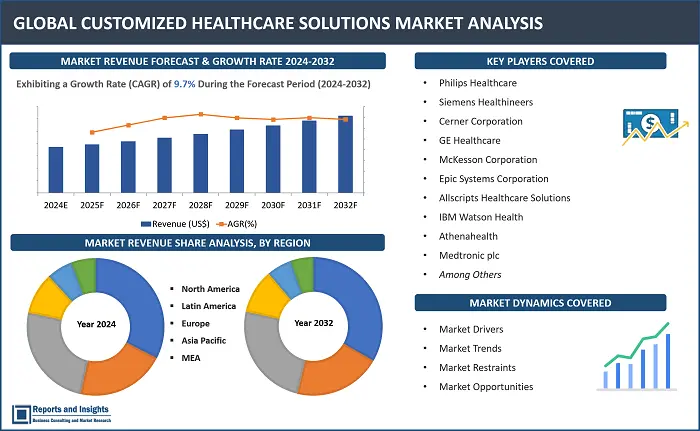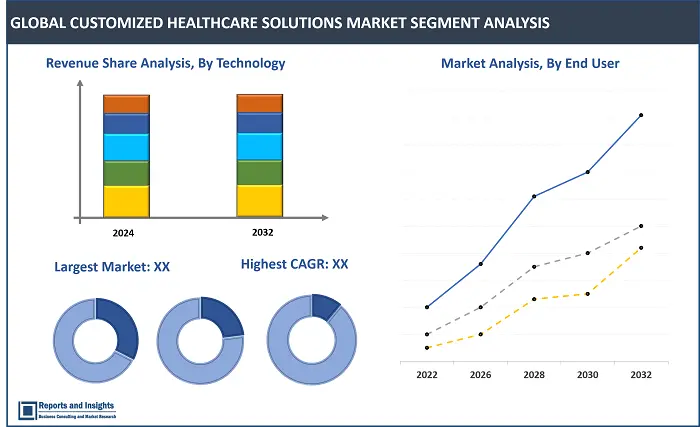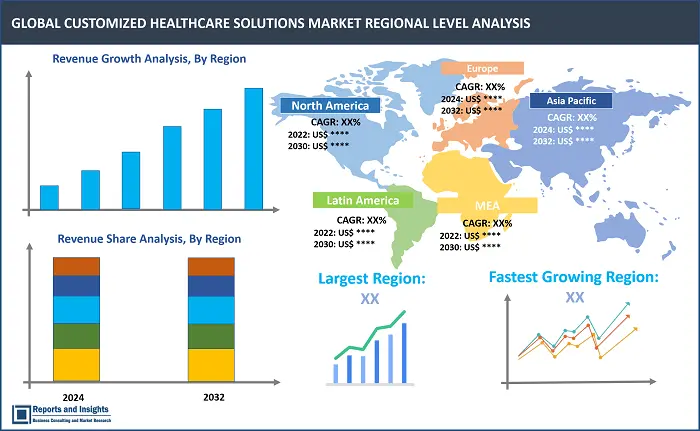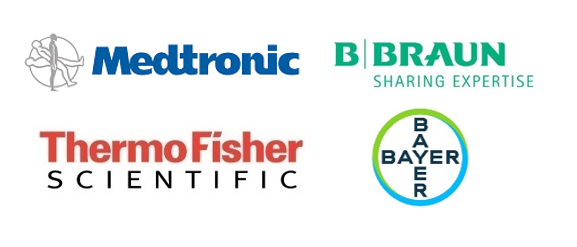Market Overview:
"As per Reports and Insights analysis, the customized healthcare solutions market is expected to register a revenue CAGR of 9.7% during the forecast period (2024 to 2032). Customized healthcare solutions refer to tailored approaches and strategies in the field of healthcare that are designed to meet the specific needs and preferences of individual patients."
|
Report Attributes |
Details |
|
Base Year |
2023 |
|
Forecast Years |
2024-2032 |
|
Historical Years |
2021-2023 |
|
Market Growth Rate (2024-2032) |
9.7% |
Customized healthcare solutions aim to provide more personalized and targeted care, taking into account the unique characteristics of each patient, such as their genetic makeup, lifestyle, environmental factors, and medical history. Components of customized healthcare solutions include digital health technologies entailing the use of digital tools, such as wearable devices, mobile apps, and remote monitoring systems that enable collection of real-time health data, which can be used to create personalized health plans, monitor chronic conditions, and provide timely interventions. Advanced analytics and AI algorithms can analyze large datasets to identify patterns and predict health outcomes. This information can be used to develop personalized treatment plans, predict disease risks, and optimize healthcare delivery. Others include telemedicine and remote care, health and wellness coaching, patient engagement and shared decision-making, and collaborative care models.
The global customized healthcare solutions market is registering significantly robust revenue growth, driven by increasing popularity and rising demand for personalized healthcare options among patients. Advances in genomics and molecular medicine have enabled the possibility for tailored treatment plans based on individual genetic profiles, enhancing therapeutic precision. Also, the integration of digital health technologies, such as wearable devices and remote monitoring, facilitates real-time data collection for personalized health interventions. Rising patient awareness, coupled with the shift towards value-based care, has prompted greater adoption of customized healthcare solutions. The convergence of personalized medicine, data analytics, and patient engagement is contributing to steady revenue growth, and this trend is expected to continue over the forecast period.

Customized Healthcare Solutions Market Drivers and Trends:
The rapid evolution of technologies such as genomics, artificial intelligence, and data analytics is a primary driver for adoption of customized healthcare solutions. These innovations empower healthcare providers to offer personalized treatment plans based on individual genetic profiles and health data. Also, increasing awareness among patients about the benefits of personalized healthcare and a growing demand for more individualized treatment approaches contribute significantly to market growth. Patients are increasingly seeking tailored solutions that align with their unique health needs and preferences, and this trend is expected to continue to gain traction.
The global aging population is a demographic trend amplifying the need for customized healthcare solutions. As individuals age, the prevalence of chronic diseases and complex health conditions rises, necessitating personalized interventions for effective disease management and improved quality of life. Furthermore, customized healthcare solutions contribute to better health outcomes by tailoring treatments to individual characteristics. This not only enhances the efficacy of medical interventions, but also reduces the risk of adverse effects, leading to improved patient satisfaction and overall well-being.
Companies in the customized healthcare solutions market can leverage benefits by adopting data-driven strategies, investing in research and development, and forming strategic partnerships. By leveraging advanced technologies and collaborating with stakeholders, companies can position themselves as leaders in providing innovative and effective personalized healthcare solutions.
Consumers gain access to more precise and effective healthcare interventions tailored to their unique needs. This results in improved treatment outcomes, reduced side effects, and a more patient-centric approach to healthcare. The convenience of remote monitoring and virtual consultations also enhances accessibility, especially for individuals with limited mobility or those residing in remote areas. Overall, rising awareness and understanding are key factors driving adoption of customized healthcare solutions and supporting revenue growth of the market.
Customized Healthcare Solutions Market Restraining Factors:
One significant factor restraining wider availability of customized healthcare solutions is high cost associated with implementing and accessing these advanced technologies. The initial investment in personalized medicine, genetic testing, and data analytics infrastructure can be substantial, limiting the affordability for both healthcare providers and patients. Also, collection and utilization of extensive personal health data raise significant privacy concerns. Patients are often hesitant to share sensitive or personal health-related information, fearing potential misuse or unauthorized access. Need for more stringent regulations and enhanced security for health data have slowed down the widespread adoption of customized healthcare solutions.
Furthermore, the lack of standardized protocols and interoperability among different healthcare systems and technologies hinders seamless integration of customized solutions. This fragmentation prevents healthcare providers from efficiently sharing and utilizing patient data, undermining the effectiveness of personalized treatment plans. At last, the stringent regulatory processes and uncertainties regarding compliance standards pose challenges to more rapid adoption of customized healthcare solutions. Inability across regulatory bodies to keep pace with the fast-evolving landscape of personalized medicine creates delays in approvals and market entry for innovative solutions.
Customized Healthcare Solutions Market Opportunity
Growing demand for telehealth services presents a lucrative opportunity for leading players in the customized healthcare solutions market. By expanding telemedicine offerings, companies can overcome geographical barriers and provide personalized consultations and remote monitoring, catering to the shifting preference for convenient and accessible healthcare. The post-pandemic era has witnessed a surge in the acceptance of remote healthcare services. Expanding telehealth offerings aligns with the evolving preferences of patients seeking personalized care from the comfort of their homes, ensuring that leading players tap into a broader patient base.
Leading players can capitalize on the advantages of collaboration by forming strategic partnerships with healthcare providers, technology firms, and research institutions. Collaborative efforts enable the sharing of resources and expertise, accelerating innovation in customized healthcare solutions and giving companies a competitive advantage. In the dynamic and complex landscape of personalized healthcare, strategic collaborations enhance the capabilities of leading players. Shared knowledge and resources facilitate the development of comprehensive solutions, ensuring that companies remain at the forefront of innovation and can offer integrated services to address diverse healthcare needs.
Also, Continuous investment in research and development is crucial for leading players to stay ahead in the competitive customized healthcare solutions market. By developing novel diagnostic tools, therapeutic approaches, and predictive analytics, companies can provide sophisticated and effective solutions that align with evolving patient needs. The healthcare sector is marked by rapid technological advancements. Investing in R&D allows companies to introduce cutting-edge solutions, maintaining relevance in the market. This proactive approach ensures that leading players offer personalized healthcare solutions that are not only current but also future-proofed.
Customized Healthcare Solutions Market Segmentation:

By Technology:
- Genomic Medicine
- Telemedicine Solutions
- Data Analytics and Artificial Intelligence
- Wearable Technologies
- Health Information Exchange Platforms
Among the technology segments in the customized healthcare solutions market, the genomic medicine segment is expected to account for the largest revenue share over the forecast period. Leveraging advancements in genetic testing and analysis offers greater understanding of individual genetic profiles, enabling highly personalized and targeted healthcare interventions. Increasing prevalence of genetic disorders, coupled with a growing emphasis on precision medicine, is driving adoption of genomic medicine. Also, ongoing research initiatives and collaborations in genomics, driven by the benefits of tailored treatment plans and disease prevention, contribute to increasing adoption and this is supporting revenue growth of this segment.
By Health Condition:
- Cardiovascular Customized Solutions
- Oncology Personalized Medicine
- Neurological Health Solutions
- Metabolic Disorder Tailored Treatments
- Genetic Disorders Interventions
The oncology personalized medicine segment is projected to account for largest revenue share among the other health condition segments. Factors such as rising prevalence of cancer worldwide is driving need for more targeted and individualized treatment approaches, and oncology personalized medicine leverages genetic and molecular profiling, and allows for precise cancer diagnoses and tailored therapeutic strategies. Increasing adoption of advanced technologies, such as next-generation sequencing, enhances the effectiveness of personalized cancer treatments. Also, a surge in research and development investments and collaborations in the field of oncology contribute to breakthroughs and innovations in the field. As awareness among healthcare professionals and patients about the potential benefits of personalized cancer care expands, the demand for oncology personalized medicine is expected to rise, and drive revenue growth of the oncology personalized medicine segment to a major extent.
By End-User:
- Hospitals and Clinics
- Diagnostic Laboratories
- Pharmaceutical Companies
- Research and Academic Institutions
- Health Insurance Providers
The hospitals and clinics segment is expected to account for largest revenue share over the forecast period. Hospitals and clinics serve as primary hubs for healthcare delivery, where a diverse range of personalized diagnostic and therapeutic solutions are implemented. Increasing prevalence of chronic diseases and expanding aging population are key factors contributing to higher patient volumes seeking personalized healthcare services in these settings. Also, integration of advanced technologies, such as genomic medicine and telemedicine solutions, within hospital infrastructures enhances the delivery of customized healthcare. The comprehensive nature of services provided, including diagnostics, therapeutics, and preventive healthcare, positions hospitals and clinics as key components in the adoption of personalized healthcare solutions. Steady investment in cutting-edge technologies and expansion of personalized healthcare offerings in these settings are expected to further support revenue generated from the hospitals and clinics segment.
Service Type:
- Personalized Diagnostics
- Customized Therapeutics
- Preventive Healthcare Solutions
- Remote Monitoring Services
- Patient Engagement Platforms
The personalized diagnostics and customized therapeutics service type segment are expected to be the most promising service type segment in comparison to other segments during the forecast period.
Segmentation By Region:

North America:
- United States
- Canada
Asia Pacific:
- China
- India
- Japan
- Australia & New Zealand
- Association of Southeast Asian Nations (ASEAN)
- Rest of Asia Pacific
Europe:
- Germany
- The U.K.
- France
- Spain
- Italy
- Russia
- Poland
- BENELUX (Belgium, the Netherlands, Luxembourg)
- NORDIC (Norway, Sweden, Finland, Denmark)
- Rest of Europe
Latin America:
- Brazil
- Mexico
- Argentina
- Rest of Latin America
The Middle East & Africa:
- Saudi Arabia
- United Arab Emirates
- South Africa
- Egypt
- Israel
- Rest of MEA (Middle East & Africa)
The North America accounts for a significant larger market share than other regions in the customized healthcare solutions market, owing to key factors such as a healthcare landscape that is characterized by a robust infrastructure, comprising technologically advanced medical facilities, research institutions, and a dynamic pharmaceutical industry. Also, presence of leading healthcare technology companies and a favorable regulatory environment contribute significantly to the rapid integration of personalized healthcare solutions. In addition, a well-established framework for Electronic Health Records (EHRs) facilitates the seamless implementation of data-driven and personalized medical interventions. Moreover, focus on precision medicine, supported by substantial investments in genomics and AI research, supports the adoption of customized healthcare, and a proactive approach to telemedicine and digital health solutions, further amplifies the accessibility and acceptance of personalized healthcare offerings. The combination of a technologically sophisticated healthcare ecosystem, research initiatives, regulatory support, and a proactive approach to digital health positions the US as a frontrunner in the adoption of customized healthcare solutions compared to other countries.
In Europe, key trends driving adoption of customized healthcare solutions include, but are not limited to, rising preference for personalized medicine, advancements in genomics and molecular diagnostics, growing utilization of telemedicine and digital health solutions, collaborative efforts between public and private sectors, and focus on healthcare data interoperability and standardization, among others. Increasing emphasis on personalized medicine is a prominent trend, and advancements in genomics and molecular diagnostics are changing the healthcare systems in countries in Europe. These advances are leading a shift towards tailoring treatments based on individual patient characteristics, and resulting in emergence of more effective and targeted interventions. Also, collaborative efforts between public and private sectors in Europe are driving innovation in healthcare, and partnerships between pharmaceutical companies, research institutions, and technology firms are resulting in the development of cutting-edge customized solutions. In addition, focus in the region on healthcare data interoperability and standardization is another key trend, and efforts to establish common data standards and interoperable systems enhance the seamless exchange of patient information, facilitating the implementation of customized healthcare solutions across borders.
In Asia Pacific region, sheer population size mainly in India and China offers an expansive market opportunity, and this coupled with steadily expanding middle class and increasing healthcare awareness opens avenues for companies can tap into a vast consumer bases seeking personalized health solutions. Also, both China and India are witnessing a surge in prevalence of chronic diseases, which is creating inclining demand for advanced healthcare technologies. Companies investing in customized healthcare solutions can address the specific healthcare needs of these populations, enhancing treatment outcomes. In addition, government initiatives and healthcare reforms in both countries are encouraging the adoption of digital health technologies, providing a conducive regulatory environment for companies to introduce innovative solutions. Moreover, collaborations with local healthcare providers and technology firms can facilitate market entry, and leveraging partnerships allows companies to navigate cultural nuances, localize services, and gain a deeper understanding of regional healthcare requirements.
Governments and private entities in the MEA region are making substantial investments in healthcare technology infrastructure. The implementation of Electronic Health Records (EHRs) and development of telehealth platforms create an environment receptive to the integration of customized healthcare solutions, and supports widespread adoption. Also, prevalence of chronic diseases is on the rise in the MEA region, and customized healthcare solutions, especially those leveraging genomics and data analytics, are gaining traction in addressing the unique healthcare needs associated with conditions such as diabetes, cardiovascular diseases, and cancer. Rising health awareness among the population in the MEA region is prompting patients to be more proactive in managing their health and seeking personalized and preventive healthcare solutions.
Leading Companies in the Customized Healthcare Solutions Market & Competitive Landscape:
The landscape in the global customized healthcare solutions market is marked by intense competition, with leading companies employing various strategies to maintain their positions and expand their consumer base and geographical reach. Some among the major companies in this competitive space include Philips Healthcare, Siemens Healthineers, Cerner Corporation, GE Healthcare, and McKesson Corporation. Philips Healthcare has been at the forefront by adopting a comprehensive approach that integrates personalized diagnostics, telemedicine, and health informatics. The company emphasizes strategic partnerships and collaborations, such as the recent collaboration with Illumina, to enhance genomics-based personalized healthcare offerings. Siemens Healthineers focuses on innovation through continuous research and development. The company invests significantly in cutting-edge technologies like AI and precision medicine. Siemens Healthineers' strategy involves offering end-to-end solutions, from diagnostics to therapeutics, ensuring a holistic approach to personalized healthcare.
Cerner Corporation stands out with its commitment to interoperability and seamless data exchange. The company's focus on Electronic Health Records (EHR) and health information exchange platforms contributes to a unified patient data ecosystem. Cerner's global expansion strategy involves forming alliances with regional healthcare providers. GE Healthcare is recognized for its diverse portfolio in personalized medicine, spanning diagnostics, therapeutics, and healthcare analytics. The company places a strong emphasis on digital health solutions and data-driven insights. GE Healthcare's strategies include targeting emerging markets and forming collaborations with local healthcare entities. McKesson Corporation distinguishes itself through its comprehensive healthcare supply chain solutions. The company leverages its expansive network to facilitate the distribution of personalized healthcare products and services. McKesson's strategic initiatives involve acquisitions and partnerships to enhance its service offerings and geographical presence.
These leading companies adopt a mix of technological innovation, strategic partnerships, global expansion, and a patient-centric approach to maintain their positions and expand their market reach in the dynamic and competitive landscape of customized healthcare solutions. Their emphasis on collaborative efforts, technological advancements, and a global outlook reflects the evolving nature of personalized healthcare on a larger scale.
Company List:
- Philips Healthcare
- Siemens Healthineers
- Cerner Corporation
- GE Healthcare
- McKesson Corporation
- Epic Systems Corporation
- Allscripts Healthcare Solutions
- IBM Watson Health
- Athenahealth
- Medtronic plc
- 3M Health Information Systems
- Oracle Corporation
- SAS Institute Inc.
- Bio-Reference Laboratories, Inc.
- Tempus Labs, Inc.
Research Scope:
|
Report Metric |
Report Details |
|
Market size available for the years |
2021-2032 |
|
Base Year |
2023 |
|
Forecast Period |
2024-2032 |
|
Compound Annual Growth Rate (CAGR) |
9.7% |
|
Segment covered |
Technology, Health Condition, Service Type, End-User, and Region |
|
Regions Covered |
North America: The U.S. & Canada Latin America: Brazil, Mexico, Argentina, & Rest of Latin America Asia Pacific: China, India, Japan, Australia & New Zealand, ASEAN, & Rest of Asia Pacific Europe: Germany, The U.K., France, Spain, Italy, Russia, Poland, BENELUX, NORDIC, & Rest of Europe The Middle East & Africa: Saudi Arabia, United Arab Emirates, South Africa, Egypt, Israel, and Rest of MEA |
|
Fastest Growing Market in Europe |
Germany |
|
Largest Market |
North America |
|
Key Players |
Philips Healthcare, Siemens Healthineers, Cerner Corporation, GE Healthcare, McKesson Corporation, Epic Systems Corporation, Allscripts Healthcare Solutions, IBM Watson Health, Athenahealth, Medtronic plc, 3M Health Information Systems, Oracle Corporation, SAS Institute Inc., Bio-Reference Laboratories, Inc., Tempus Labs, Inc. |

